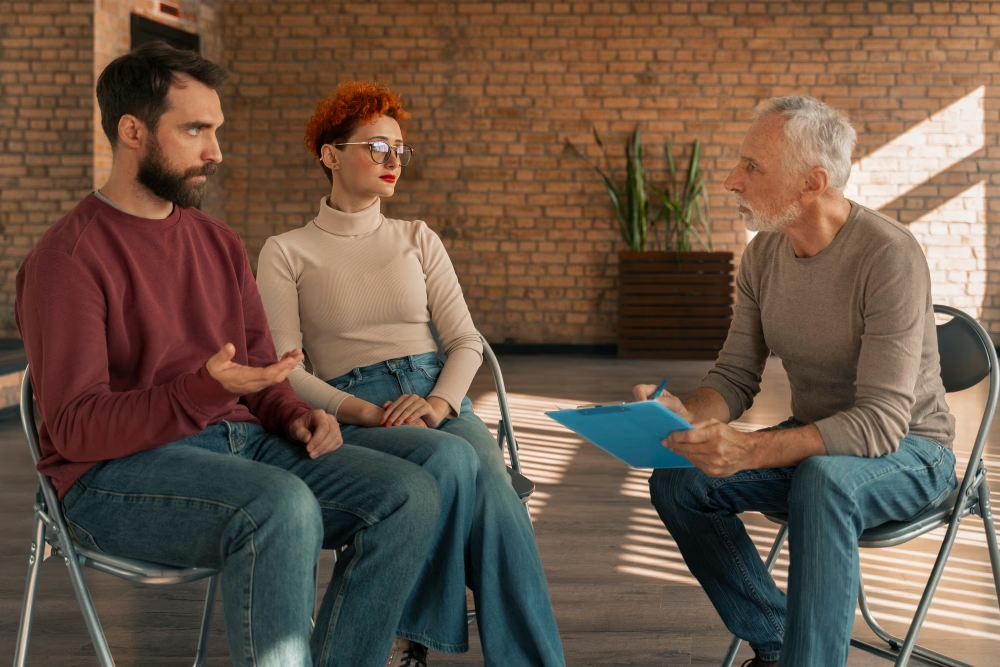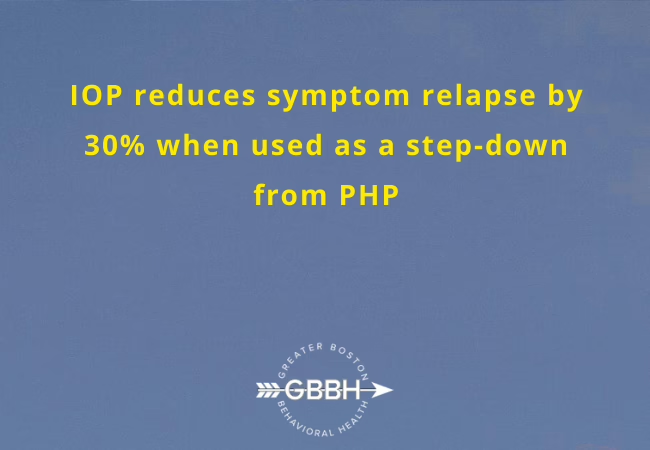Recovery from mental illness or substance use isn’t a one-step solution—it’s a carefully structured journey that moves through several phases. One of the most critical transitions in that journey is moving from a Partial Hospitalization Program (PHP) to an Intensive Outpatient Program (IOP).
This step-down phase allows individuals to maintain therapeutic momentum while slowly regaining independence. But if not managed correctly, this period can also be vulnerable. That’s why at Greater Boston Behavioral Health, we specialize in providing seamless care as individuals transition from intensive, all-day programming to the more flexible but still structured support of IOP.
Understanding PHP and IOP: The Key Differences
Before diving into how the transition works, let’s clarify what each level of care entails.
What Is a Partial Hospitalization Program (PHP)?
A Partial Hospitalization Program in Massachusetts is one of the most intensive forms of outpatient care, offering:
- 5–6 hours of treatment daily
- 5 days per week
- Structured programming with a focus on crisis stabilization
- Daily group therapy, individual therapy, medication management
- Psychoeducation and wellness planning
Often used after an inpatient treatment program in Massachusetts or as an alternative to hospitalization, PHP helps individuals stabilize in a safe, clinical environment.
What Is an Intensive Outpatient Program (IOP)?
An Intensive Outpatient Program in Massachusetts is the next level of care after PHP and includes:
- 3–4 hours of treatment per day
- 3–5 days per week
- Greater flexibility with scheduling
- Focused on real-world application of skills
- Continued support via group therapy, individual sessions, and medication management
At Greater Boston Behavioral Health, IOP allows clients to start returning to work, school, or caregiving roles—while still receiving robust therapeutic support.
Why the PHP-to-IOP Transition Is Crucial
The PHP-to-IOP transition acts as a bridge between high-intensity care and full independence. Without this phase, individuals may face:
- Gaps in clinical support
- Increased risk of relapse
- Poor real-world coping without reinforcement
- Difficulty adjusting to less structure
When managed properly, this transition empowers individuals to:
- Solidify their progress
- Practice skills in real-life situations
- Prevent backsliding
- Build confidence and autonomy
- Reduce reliance on acute services over time
Signs You’re Ready to Transition from PHP to IOP
You may be ready to move from PHP to IOP if:
- Your acute symptoms (anxiety, depression, suicidal ideation, mania) have decreased
- You can manage basic daily responsibilities with limited support
- You’re able to engage in group therapy and apply coping strategies
- You’ve demonstrated medication compliance and stability
- You’re motivated to continue progress in a less intensive setting
- You’re looking to return to work, education, or family responsibilities with support
If you’re still struggling with severe mood swings, emotional dysregulation, or substance cravings, our clinical team may recommend additional time in PHP or supplemental services such as anger management therapy in Massachusetts.
What the Transition Looks Like at Greater Boston Behavioral Health
Our mental health treatment center in Massachusetts follows a structured approach to ensure each step down in care is personalized and well-supported.
1. Discharge Planning from PHP
We begin planning your step-down from PHP weeks in advance by:
- Reviewing progress and goals with your treatment team
- Consulting with psychiatrists and therapists
- Identifying ongoing challenges or relapse risks
- Customizing your care plan for IOP, including group focus and individual therapy topics
This collaborative process ensures a smooth clinical handoff to your new care team.
2. Orientation to IOP
Once you begin IOP, you’ll be welcomed with:
- A full schedule for the week ahead
- Introduction to your group leaders and peers
- Individual session scheduling
- Review of your updated treatment goals
We’ll help you adjust to the new flow while preserving the therapeutic intensity that has helped you succeed in PHP.
3. Continued Therapeutic Support
IOP doesn’t mean less care—it means targeted, adaptable care. During your time in IOP, you’ll still receive:
- Evidence-based group therapy: CBT, DBT, trauma recovery
- Individual therapy focused on long-term growth
- Medication management and symptom monitoring
- Psychoeducational workshops (e.g., nutrition, boundaries, relapse prevention)
- Specialized tracks such as anger management therapy in Massachusetts for those dealing with aggression, impulsivity, or reactivity
Real-Life Benefits of IOP After PHP
Transitioning to IOP lets you:
✔ Return to Real Life Gradually
You can work part-time, attend school, or care for family while still having a strong clinical framework around you.
✔ Reinforce Skills Through Daily Practice
Apply what you’ve learned in PHP in real-world situations, and bring your experiences back to IOP for reflection and coaching.
✔ Maintain Accountability
Group and individual therapy sessions keep you honest about your progress, setbacks, and ongoing challenges.
✔ Reduce Isolation
You’ll stay connected to a community of peers and providers, especially valuable in early stages of real-life reintegration.
Common Conditions We Support in PHP and IOP
At Greater Boston Behavioral Health, our mental health programs in Massachusetts address a range of clinical conditions:
- Major depressive disorder
- Generalized anxiety disorder
- PTSD and trauma
- Bipolar disorder
- Dual diagnosis (mental health + substance use)
- Borderline personality disorder
- OCD and panic disorders
- Behavioral and emotional regulation concerns (including anger management)
Each program is individualized—because recovery isn’t one-size-fits-all.
Why Choose Greater Boston Behavioral Health?
As a trusted mental health treatment center in Massachusetts, we offer:
- Expert clinical leadership with licensed therapists and board-certified psychiatrists
- Seamless transitions between levels of care: inpatient, PHP, IOP, and outpatient
- Individualized treatment planning tailored to your goals
- Specialized programming, including trauma-informed therapy, dual diagnosis support, and anger management therapy in Massachusetts
- Flexible scheduling and telehealth options
- An inclusive, affirming environment where every person is treated with dignity and respect
Conclusion
Transitioning from a Partial Hospitalization Program to an Intensive Outpatient Program isn’t a sign that you’re finished with care—it’s a sign that you’re progressing. It means you’ve stabilized, developed core skills, and are ready to apply them in the real world—while still having the safety net of professional support.
At Greater Boston Behavioral Health, we’re here to make sure that next step is smooth, empowering, and built around your individual needs. Whether you’re managing a mental health diagnosis, navigating recovery from addiction, or learning to regulate emotions through anger management therapy in Massachusetts, our team is ready to walk with you through every phase of healing. Call us today at 888.278.0716 to schedule your confidential consultation. You’ve come this far. Let’s make sure your next step is the right one.
FAQ on Transitioning from PHP to IOP – What You Need to Know
What’s the main difference between PHP and IOP?
A Partial Hospitalization Program (PHP) provides full-day treatment, typically 5–6 hours per day, 5 days a week. An Intensive Outpatient Program (IOP) offers similar therapies with a reduced time commitment—usually 3–4 hours per day, 3–5 days a week—allowing more flexibility for real-life responsibilities.
How do I know I’m ready to move from PHP to IOP?
You may be ready if your symptoms have stabilized, you’re showing consistent progress in therapy, and you’re prepared to handle more independence. Our clinical team will guide you through a professional assessment to determine readiness.
Will I still receive individual therapy and medication support in IOP?
Yes. At Greater Boston Behavioral Health, our Intensive Outpatient Program in Massachusetts includes individual therapy, group sessions, psychiatric care, medication management, and specialized services like anger management therapy.
Is the transition from PHP to IOP immediate?
Usually, yes. Our staff ensures a seamless transition so there are no gaps in care. You’ll continue treatment with consistent therapeutic structure and familiar clinicians whenever possible.
What kinds of conditions does IOP treat after PHP?
IOP treats a wide range of diagnoses, including depression, anxiety, PTSD, bipolar disorder, addiction, and emotional regulation issues. Our mental health programs in Massachusetts are designed to support long-term recovery and independence.


